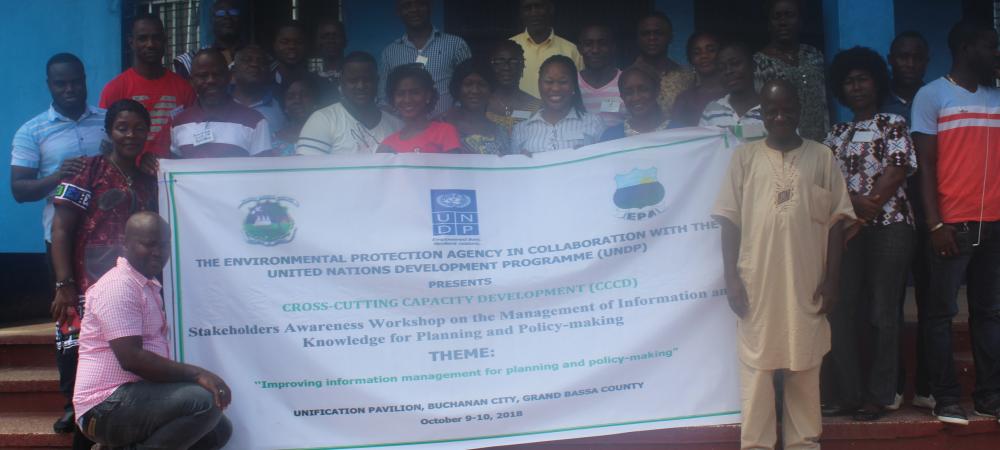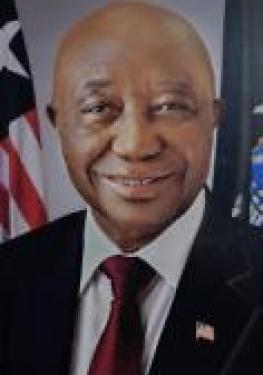
In its quest to strengthen national capacities in meeting global environmental obligations, the Environmental Protection Agency (EPA) of Liberia in conjunction with the United Nations Development Program (UNDP) has concluded a two day stakeholder’s awareness workshop on the ‘management of information and knowledge for planning and policy-making’ in Buchanan, Grand Bassa County from September 9-10, 2018.
The training, which attracted 40 participants from line Government ministries, agencies, and civil society organizations was held under the Cross-Cutting Capacity Development Project.
Liberia’s Cross-Cutting Capacity Development (CCCD) Project Manager, Aaron S. M. Wesseh disclosed that the two day CCCD’s awareness workshop was intended to increased stakeholders’ understanding of the differences between data, information and knowledge and how information and knowledge management can enhance planning and policy-making.
Mr. Wesseh noted that the training held in Buchanan, Grand Bassa County identified challenges and barriers that hinder mainstreaming gender in the management of information and knowledge for planning and policy-making and to adopt strategies for integrating environmental data, information and knowledge into planning and policy making.
According to him, the Government of Liberia through the EPA obtained funding from the Global Environmental Facility (GEF) to support the Cross-Cutting Capacity Development (CCCD) Project for Liberia.
“The project will support the Government of Liberia to strengthen national capacities to meet global environmental obligations with the framework on sustainable development priorities,” he pointed out.
Mr. Wesseh explained that the project has four components including the establishment of an integrated environmental knowledge management system (EKMS), enhanced institutional and technical capacities for mainstreaming, improving awareness of global environmental values and updating the National Capacity Self-Assessment (NCSA).
The project, he added is in line with the GEF-6 CCCD Strategy objective 1, 3, and 5 which call for countries to: a) integrate global environmental needs into management information systems and monitoring, b) integrate MEA provisions into national policy, legislative, and regulatory frameworks, and c) update NCSAs, respectively.
Mr. Wesseh further indicated that the project will take an adaptive collaborative management (ACM) approach to implementation, which calls for stakeholders to take an early and proactive role in the mainstreaming exercises, as well as to help identify and solve unexpected implementation barriers and challenges.
By taking an ACM approach, Mr. Wesseh noted that the project activities and outputs can be more legitimately modified and adapted to maintain timely and cost-effective project performance and delivery.
It is being implemented under the National Implementation Modality (NIM).
In a Power Point presentation at the two day awareness workshop, EPA Manager for Planning and Policy, Z. Elijah Whapoe underscored the need for organizations to begin planning, because according to him it would help them chart a course for the achievement of their goals.
He said planning help institutions make progress and enable them achieve their desired results.
Mr. Whapoe cautioned managers to use what is already known from program evaluation to make policy decision and as well builds more knowledge to better inform future decision.
This approach, according to Mr. Whapoe prioritizes rigorous research findings, data, analytics, and evaluation of new innovations above anecdotes, ideology, marketing, and inertia around the status quo.
Mr. Whapoe indicated that policy sets idea or as a basis for decision making.
Speaking further on ‘how collaboration and coordination enhance information and knowledge management in planning and policy-making’, Mr. Whapoe noted that it is important to rrecognize that there exist information gaps and then strengthen coordination and collaboration
He also spoke of the need to update and validate environmental data and information needs assessment and developed strategy and plan for the establishment and management of information and knowledge management system.
Whapoe indicated that development of data and information sharing protocol and the identification and the capturing of institutional knowledge are necessary for collaboration and coordination enhance information and knowledge management in planning and policy-making.
For the presentation on data management and sharing, Caesar Morris said there are various ways to share research data including depositing them with a specialist data center or data archive or data bank.
Mr. Caesar, an ICT Consultant also suggested that data be submitted to a journal to support publication which would make them available online via a project or institutional website.
According to him, researches offer data to data archives for preservation, researchers themselves should convert data to a preferred data preservation format, as the person who knows the data is in the best position to ensure data integrity during conversions.
He recommended that data be verified after conversions and spoke on various ways to store data.
Mr. Caesar noted that quality control of data is an integral part of all research and takes place at various stages.
He disclosed that quality control of data must take place during data collection, data entry or digitization, and data checking.
During data collection, Caesar researchers must ensure that the data recorded reflect the actual facts.
He further noted that physical security, network security and security of computer systems and files all need to be considered to ensure security of data and prevent unauthorized access, changes to data, disclosure or destruction of data.
Data security may be needed to protect intellectual property rights, commercial interests, or to keep personal or sensitive information safe, he noted.
Also speaking, Liberia Institute of Statistics and Geo Information Services (LISGIS) Data Analyst and Assistant Director for Industrial Statistic, Andrew A. Tellewoyan, II disclosed that data can be classified as either categorical or quantitative.
He noted that data that can be grouped by specific categories are referred to as categorical data and said example can be race, sex, age groups, educational levels, etc.
Tellewoyan added that categorical data use either the nominal or ordinal scale of measurement and noted that data that use numerical values to indicate how much or how many are referred to as quantitative or discrete data.
“Quantitative data are obtained using either the interval or ratio scale of measurement. Eg: Height, size, length, score, age, etc,” he added.
He observed that a categorical variable is a variable with categorical data, and a quantitative variable is a variable with quantitative data.
Speaking further, Mr. Tellewoyan noted that statistical analysis is appropriate for a particular variable depends upon whether the variable is categorical or quantitative.
“If the variable is categorical, the statistical analysis is limited. We can summarize categorical data by counting the number of observations in each category or by computing the proportion of the observations in each category,” he pointed out
According to him, arithmetic operations provide meaningful results for quantitative variables and noted “For example, quantitative data may be added and then divided by the number of observations to compute the average value.
This average, Tellewoyan explained is usually meaningful and easily interpreted and added in general, more alternatives for statistical analysis are possible when data are quantitative.
Speaking on the role of the media in information and knowledge management, EPA Media and Communication Specialist, Danise Love Dennis said the media supply the information in true and unbiased form and let the public choose what they may be the best in their interest.
According to her, the media reminds politicians about their unfulfilled promises at the time of elections and said they can be help electorate during elections to vote for the appropriate candidates.
Touching on the information life cycle, Madam Dennis said information life cycle begins when useful or relevant information arrives at or is created within an organization in a wide variety of formats using different equipment and technologies.
According to her, information is transmitted to those who need it and upon receipt is used in the conduct of university business and later filed or stored according to classification scheme to permit quick retrieval from in a storage devise and protected and maintained to safeguard the integrity of information over time.
During this stage, Madam Dennis said information is viewed as either active or inactive.
“When information reaches the end of its retention period and has no legal, fiscal or administrative value, it is securely destroyed or preserved permanently in an archive for historical reference or research purposes,” she pointed.
The workshop identified the followings as bottleneck to the realization of environmental information and knowledge management for planning and policy-making; lack of budgetary support, lack of coordination, lack of national data depository, individuals being custodian of institutional data and information, and less priority being given to data, information and knowledge management by institutions' decision makers.
However, the workshop recommended the followings measures as some of the means of enhancing data and information management;build a national data bank, adequate budgetary support and encourage collaboration and coordination between and among institutions to sustain environmental data information and knowledge for planning and policy-making.
During the closing ceremony, the UNDP representative at the workshop Madam Beatrice Pelenah extended thanks to the participants for the manner in which they conducted themselves. The process was very participatory and that was great of you she said.
Mr. Ben Karmorh, Multilateral Environmental Agreement Focal Point speaking on behalf of the EPA thanked the project team for the splendid planning and organization of the workshop and also appreciated GEF for funding. We are also working with the National Adaptation Project (NAP) and that project is also doing great and has been rated high by our international partners. Mr Karmorh said the EPA was doing everything for the CCCD project to be a success. He than concluded by assuring the environmental focal points of more training opportunities at both local and international levels.
Mr. Aaron S.M. Wesseh, Project Manager of the project thanked the UNDP and GEF for the funding and support to the project. He called on the participants to take ownership of the project as its goal is for Liberia to make better decision in integrating global environmental obligations in sustainable development priorities.



